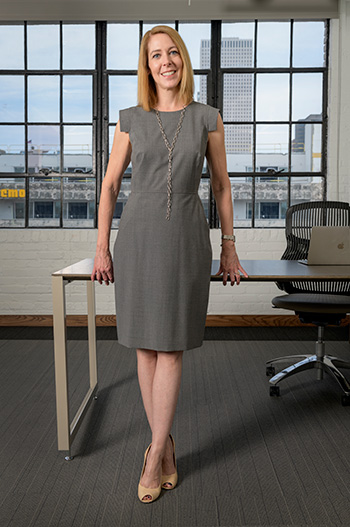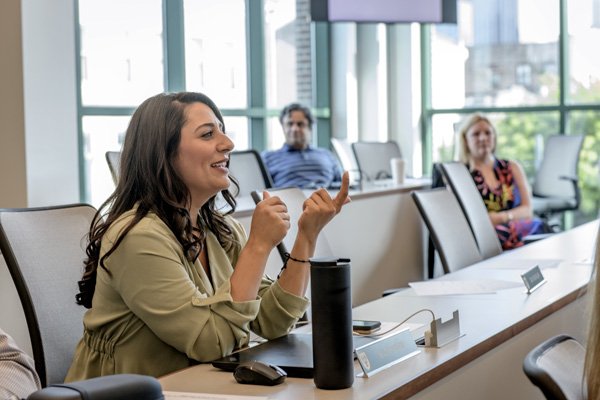
As executive director of Executive and Professional Education, Lara White is leading the Freeman School’s new custom executive education program.
Last October, a group of 16 international public health professionals spent an afternoon at the Freeman School learning strategies to improve their decision making.
Over the course of a few hours, the participants, members of the ExxonMobil Global Health Scholars program at Oxford University, enhanced their understanding of decision-making processes, including recognizing common cognitive biases that affect managerial decisions, an essential skill to helping them tackle public health issues more effectively and efficiently.
While the course sounds like many the Freeman School has offered over the years, this one was different: The students weren’t part of an executive MBA cohort, and the course wasn’t one the Freeman School regularly offers. It was designed especially for the group to provide them with specific skills they were seeking.
The managerial decision-making seminar was the inaugural offering of the Freeman School’s new Office of Executive and Professional Education, a newly launched division of the Stewart Center for Executive Education dedicated to creating and delivering short-term non-degree programs for companies, executives and working professionals.
“Years ago, companies would send lower-level managers or professionals in technical areas, like engineers, to an MBA program to prepare them for more senior management,” says Ira Solomon, dean of the Freeman School. “That’s not happening as much anymore. Instead, companies are identifying two- or three-week courses at leading business schools, and they’re sending them there for that management training. As that sea change has occurred, demand for non-degree programs has risen.”
“A lot of people don’t need a full master’s degree program,” adds Lara White, executive director of Executive and Professional Education, who was hired last year to lead the initiative. “Sometimes they just need a refresher course or additional skills for a new job responsibility or advancement opportunity. Our focus is on meeting those changing needs and providing the business community with the skills they need to succeed.”
The Freeman School has offered education for working business and other professionals since 1983, but virtually all of those offerings up until now have been degree-granting programs. When the Stewart Center for Executive Education was established in 1992, it was originally intended to oversee both degree and non-degree executive programs, but the Freeman School continued to focus on degree programs.
Now, more than 25 years after committing to non-degree programming, the Freeman School is finally bringing the full vision of the Stewart Center for Executive Education to fruition.
Why now?
According to Solomon, it’s a confluence of factors. One is the aforementioned rise in demand for non-degree programs. Another is the reduced barriers to entry. Thanks in part to the Internet, marketing and promoting non degree programs requires much less of an investment than it did in the 1990s. A third factor is human resources. Delivering custom programs requires faculty, and until recently the Freeman School had barely enough full-time faculty to teach its fast-growing degree programs. Since 2011, however, the Freeman School has steadily grown its faculty to the point where delivering non-degree programs with existing faculty is finally feasible.
A fourth factor — and perhaps the leading driver of the initiative — is the opening of the Stewart Center CBD, which gives the Freeman School state-of-the-art classroom space in the heart of the city’s business center. Located just blocks from Poydras Street in the city’s “innovation corridor,” the facility offers easy access to working professionals from across the spectrum.
“This is a model that we didn’t invent,” Solomon says. “It’s typical: You bring the working-professional-oriented programs closer to where people are working.”
“A lot of companies are interested in going off site for programs,” adds White. “They prefer to have their people be away from the office so they can focus all their attention on the educational programming being presented. Having facilities that are downtown and easily accessible to businesses is a huge advantage.”
White is no stranger to professional education. She comes to the Freeman School from Adams and Reese LLP, where in addition to practicing as an attorney she organized numerous continuing legal education events for lawyers.
“I hold a leadership position with the ABA Section of Litigation, and a lot of my volunteer work with them has been focused on developing professional education programming all over the country,” White says. “I’ve been involved with everything from finding speakers and developing the course content to working on the marketing and programming materials and networking events, so this is something I’ve enjoyed doing for more than a decade.”

With the opening of the Stewart Center CBD, the Freeman School can offer custom executive education programs to companies at a convenient downtown New Orleans location.
White says the Freeman School initially plans to focus on custom programs. That includes working closely with local, national and international companies to develop and deliver business education programs for their leadership, managers and employees and working with professional or trade associations to offer programs for members.
Custom programs, White says, are a logical place to start. They offer companies the flexibility to design courses that meet their unique needs to maximize their value. In developing the programs, companies can work directly with the faculty members to ensure that the program is tailored specifically to their goals and audience. The format, length and location of each program are also customizable.
Since delivering the ExxonMobil Global Scholars program last October, Executive and Professional Education has worked on developing custom non-degree programs on everything from change management to growth strategy and data analytics.
While custom programs are the initial focus, White says the Freeman School is also planning to design a number of open-enrollment programs. This September, the Freeman School is partnering with the National Venture Capital Association and the University of California, Berkeley School of Law to offer Venture Capital University Live, a two-and-a-half day open-enrollment program that will provide practical training on venture finance for entrepreneurs, investors, attorneys and others interested in emerging company finance.
Eventually, Solomon says the goal is to offer both custom programs and open-enrollment programs like VC University Live, including some online programs.
“We’re being very deliberate about this,” Solomon says. “We’re not just jumping in the deep end of the pool. We want to learn how to be excellent in this space, and as we do, we’ll offer more and more programs. We’re committed to building non-degree programs into a central part of the Freeman School.”

